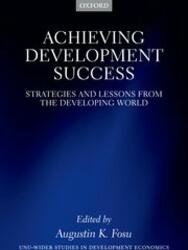Book Chapter
The United Arab Emirates
Some Lessons in Economic Development
Oil was discovered in the United Arab Emirates (UAE) just 50 years ago. During that time, UAE has been able to transform itself into a rapidly modernizing country, which is fast becoming a major economic hub and a key player on the international economic landscape.
This paper discusses a number of aspects of the development strategy of the UAE that contributed to its phenomenal development: (i) the political system, which has resulted in a perception of stability and minimal political risk, encouraging investment; (ii) oil; (iii) development strategies that have resulted in a very dynamic business environment; (iv) open importation of foreign skills and management; (v) labour policies that have enabled the immigration of vast numbers of foreign lower-skilled workers.
There are, of course, also concerns for the future, and indeed each of the five positive attributes listed above has a flip side which is a potential major challenge for the future.
 Join the network
Join the network